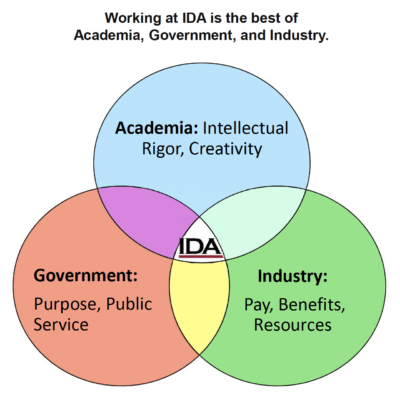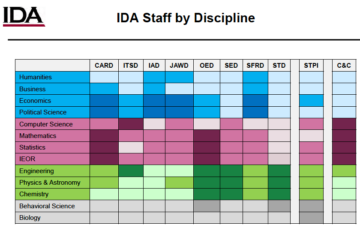The Best of Three Worlds

If you enjoy thinking about the big picture of your research, working on teams, are driven by knowing your work will have impact on the world and enjoy continually learning new things, then you were immediately hooked on careers at the federally funded research center recently highlighted through Careers Beyond Academia. Professionals from the Institute for Defense Analyses (IDA) shared why they love working there.
For Steven Rabinowitz, proud parent of a Cornell graduate (P’16), working at the IDA combines the best of three worlds: the flexibility and intellectual stimulation of academia, the public impact of government work, and the funding and urgency of the industrial world. He confesses not having prior experience in SONAR though he now oversees the Undersea Warfare task. Stressing that the IDA, like most other Federally Funded Research Centers, hires PhDs for their brainpower, he indicated most of his learning was through on-the-job training. He learned the specifics of his role thorough taking courses in-house and off-site, attending conferences, and mentoring from within and across units, all while working.
Abby Goldman, PhD ‘18 agrees. She recollects in her first month on the job she was asked to lead a panel workshop on a topic she had no prior training in. She cites participation in Careers Beyond Academia (back then, the BEST Program) set her up for exploring and test-driving multiple aspects of her interests in science policy, communication, and outreach. “I conducted more than 20 informational interviews as part of my career exploration process while at Cornell,” says Goldman, who received her doctorate in Materials Science and Engineering. She came to realize she wanted to use her technical and analytical training and still do research, just not as an academic professor. Now she works as a research staff member at the IDA Science and Technology Policy Institute (STPI). The institute is one of three federally funded R&D centers run by the IDA that is contracted to answer the most challenging U.S. security and policy questions with objective analysis, leveraging extraordinary scientific, technical and analytical expertise. These questions can be small, such as ‘how many people are getting higher education/training?’ or big, like ‘how do we encourage people to get education?’ and are answered by expert teams.
These interdisciplinary teams across the divisions and directorates of the IDA assess, analyze, and report on a spectrum of activities from technologies, programs, capability, and operations. They are made up of economists, social and political scientists; physical and life scientists; math, statistics and operations researchers; computer scientists; business administrators and humanists who all work together to provide objective information to decision makers.
 Karina Figueira Willette, Human Resources Business Partner at the IDA, shared that 65% of their research staff hold doctorates, with low turnover. On-going professional development is the norm throughout your career at the IDA, Rabinowitz adds. “It takes about 2 years to become an expert, to learn the subject matter, and you get this through mentoring along the way.” The different centers have a mix of employees with varying disciplinary backgrounds, thus ensuring varied perspectives to objectively answer key questions.
Karina Figueira Willette, Human Resources Business Partner at the IDA, shared that 65% of their research staff hold doctorates, with low turnover. On-going professional development is the norm throughout your career at the IDA, Rabinowitz adds. “It takes about 2 years to become an expert, to learn the subject matter, and you get this through mentoring along the way.” The different centers have a mix of employees with varying disciplinary backgrounds, thus ensuring varied perspectives to objectively answer key questions.
In a given day, Goldman might complete tasks for different sponsors to address questions on policy and development, program evaluation, strategic planning and metrics, science and technology assessment, or economic and business case analysis. Timeframes of her typical projects, unlike the long-term academic questions that might take a lifetime to answer, might be between a month to a year, occasionally even responding to a specific sponsor question within a day.
The speakers ended by answering audience questions and sharing opportunities for graduate students in the Washington, D.C. area, including the Summer Associate, Data Science Fellowship, and Science Policy Fellowship programs, all with January application deadlines.
About the speakers
Abby Goldman, PhD’18, Science and Technology Policy Institute (STPI)
Steve Rabinowitz, P’16, Systems and Analysis Center (SAC)
Karina Figueira Willette, Institute for Defense Analyses
About Careers Beyond Academia
We help Ph.D. students and postdocs from all disciplines develop efficient strategies to expand their networks, build skills and make informed career choices about their career paths after Cornell. We do this by helping you explore and test drive specific aspects of various careers through flexible, experiential, empowering opportunities.
Contact gradcareers@cornell.edu


